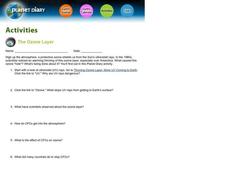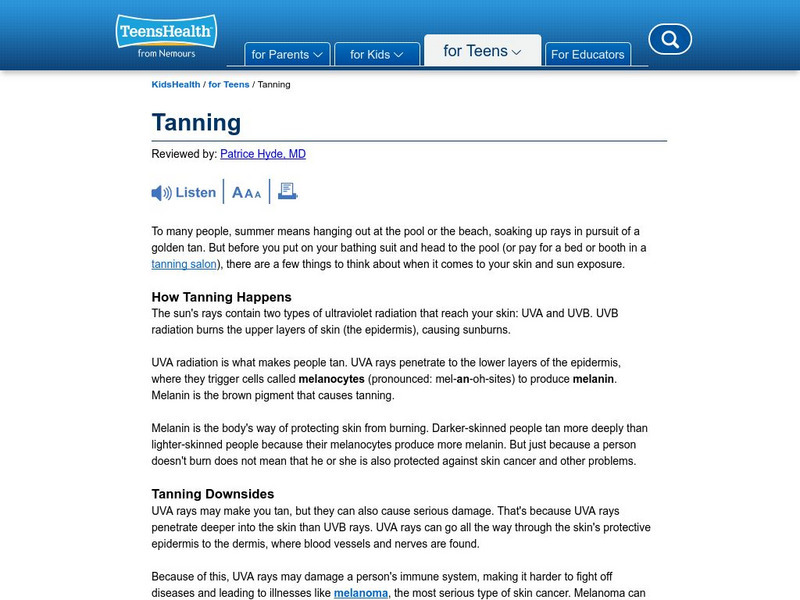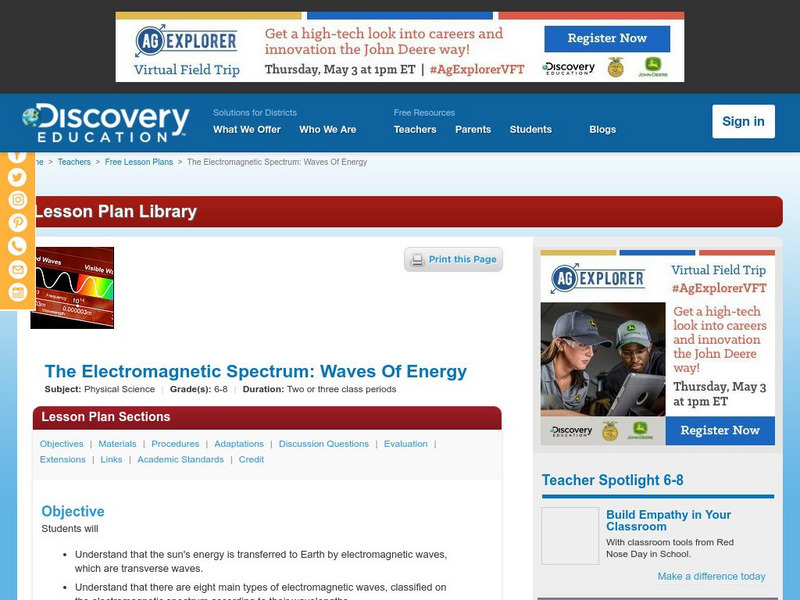Curated OER
What Wavelength Was That?
A combination of informative text, photos, and graphics comprise this sharp show on electromagnetic radiation. Some slides mention hands-on activities for demonstrating concepts, so if you want to include them you will need to figure out...
Curated OER
The Ozone Layer
In this ozone worksheet students complete an interactive activity on the thinning of the ozone then answer a series of questions on the earths UV rays.
Curated OER
Properties of Light
In this light spectrum worksheet, students will read a diagram and a chart listing information about the different types of light rays from Gamma rays to radio waves. Then students will write a short essay about a new life-form that...
Curated OER
UV Rays, sunscreen effectiveness
Young scholars identify and define that invisible UV rays can be harmful. Then they explore the effects of UV radiation on objects that react UV rays and what products are most effective in blocking UV rays. Students also make...
Curated OER
UV Rays
Fourth graders study the effects of UV rays and practice finding the UV index for where they live. In this health lesson, 4th graders listen to a lecture about ultraviolet rays, then find the UV index in their area and write a story...
Curated OER
Kids Health: Tanning
Most people, especially young adults, think they look better with a tan. But excessive sun exposure can cause serious damage to your skin and can lead to skin cancer. Find out how to be smart in the sun.
Environmental Education for Kids
Eek!: Hole in the Ozone Layer
Site creatively explains the causes and effects of ozone depletion. Then asks the question. Is there a hole? Grades 3-6.
Curated OER
Kids Health: Sun Smarts
Sunburn isn't just painful, it's dangerous. Learn about the connection between sun exposure and skin cancer, and learn how treat sunburn. Also, learn how to prevent getting sunburn with three simple tips. Use the links on this page to...
Curated OER
Kids Health: Sun Safety
Learn why the Sun keeps us healthy, and also, learn how the Sun can harm our skin, eyes, and immune system. Read about the dangers associated with the Sun's ultraviolet rays, and read tips to help you stay safe when outside in the summer...
Discovery Education
Discovery Education: The Em Spectrum: Waves of Energy
Young scholars are introduced to the electromagnetic spectrum through this group research activity. Each group investigates a different wavelength range within the em spectrum and reports back to class. Discussion ideas also included.
Other
Fluorescent Mineral Society: The Ultraviolet Spectrum
This resource presents a discussion of the nature and properties of ultraviolet light. The manner in which minerals emit UV light is described and explained.
Alabama Learning Exchange
Alex: Ultraviolet Radiation
An interactive PowerPoint will be used to introduce the electromagnetic spectrum. Students use UV beads to observe changes caused by the sun's rays and evaluate sunscreen effectiveness. Harmful effects of UV exposure will be described...
Environmental Education for Kids
Eek!: Outdoor Safety: Warning! The Rays of the Sun Can Be Harmful!
Learn about the harmful effects on humans of ultraviolet radiation caused by the depletion of the ozone layer.
NASA
Electromagnetic Spectrum: Ultraviolet Waves
Ultraviolet (UV) light has shorter wavelengths than visible light. Though these waves are invisible to the human eye, some insects can see them. The specific wavelength values are given. Uses and applications of these waves are explained.
Other
Astrophysics Institute Potsdam (Aip): An Ultraviolet Space Observatory
A discussion of ultraviolet light and its interaction with the atmosphere. Describes the UV detectors on a spacecraft which are used to study the UV light emissions from astronomical bodies.
Environmental Education for Kids
Eek!: Outdoor Safety: Jeepers, Creepers, How Do You Protect Your Peepers?
Learn how to protect your eyes from harmful sun rays.














